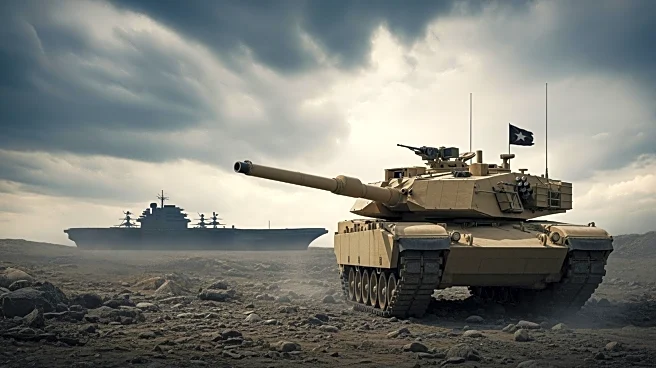What's Happening?
Venezuela has heightened its military readiness in response to the arrival of the USS Gerald R. Ford Carrier Strike Group in Caribbean waters. Defense Minister Vladimir Padrino López announced a 'massive deployment' of Venezuela's armed forces, including
ground, aerial, naval, riverine, and missile units, involving nearly 200,000 personnel. This move is seen as a defensive measure against what Venezuela perceives as a potential U.S. invasion aimed at ousting President Nicolás Maduro. The U.S. has justified its military presence in the region as part of operations to combat drug trafficking, but Venezuelan officials have accused Washington of imperialistic intentions.
Why It's Important?
The military standoff between Venezuela and the United States marks a significant escalation in tensions, with both nations claiming defensive motives. For Venezuela, the threat of U.S. aggression serves as a rallying point for national unity amid internal unrest and international isolation following Maduro's contested reelection. The U.S. military buildup in the Caribbean, the largest in decades, underscores the strategic importance of the region and the potential for conflict. The situation poses risks for regional stability and could impact U.S.-Latin American relations, with implications for international diplomacy and security.
What's Next?
As tensions rise, both Venezuela and the U.S. continue to assert their defensive postures, with military forces positioned across the Caribbean. The situation remains volatile, with the potential for direct confrontation if diplomatic efforts fail. The international community may seek to mediate to prevent escalation, while regional allies could be drawn into the conflict. The U.S. may continue its operations against drug trafficking, while Venezuela could further mobilize its forces to deter perceived threats.
Beyond the Headlines
The confrontation highlights broader geopolitical dynamics, including U.S. influence in Latin America and Venezuela's alliances with other nations. The situation raises questions about sovereignty, intervention, and the role of military power in international relations. It also reflects the challenges faced by nations with contested leadership and the impact of external pressures on domestic politics.















